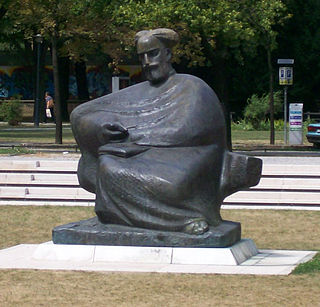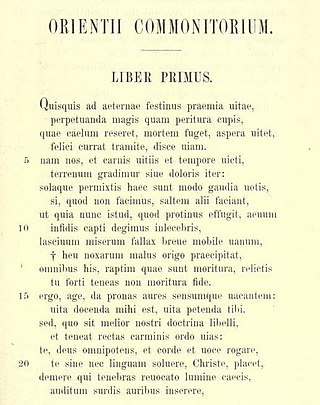Background
Little is known of his life, but he was probably French. His sole attributable work is Architrenius (The Prince of Lamentations), a Latin poem in eight cantos. The poem was written in imitation of classical Latin poets, sometimes borrowing whole verses from chosen authors. He dedicated his work to Walter de Coutances, just after Walter had become Archbishop of Rouen (1184).
Of John of Hauville's later life nothing is known, except that his pupil, Gervase of Melkley, wrote of him in the past tense in his Ars poetica, written around 1210: John of Hauville was therefore probably dead by then. Architrenius was a great success and was frequently copied and commented on before its first printing in 1517, at Paris, by Jodocus Badius Ascencius.
Andreas Capellanus, also known as Andrew the Chaplain, and occasionally by a French translation of his name, André le Chapelain, was the 12th-century author of a treatise commonly known as De amore, and often known in English, somewhat misleadingly, as The Art of Courtly Love, though its realistic, somewhat cynical tone suggests that it is in some measure an antidote to courtly love. Little is known of Andreas Capellanus's life, but he is presumed to have been a courtier of Marie de Champagne, and probably of French origin.

Quintus Ennius was a writer and poet who lived during the Roman Republic. He is often considered the father of Roman poetry. He was born in the small town of Rudiae, located near modern Lecce, Apulia,, a town founded by the Messapians, and could speak Greek as well as Latin and Oscan. Although only fragments of his works survive, his influence in Latin literature was significant, particularly in his use of Greek literary models.
Latin literature includes the essays, histories, poems, plays, and other writings written in the Latin language. The beginning of formal Latin literature dates to 240 BC, when the first stage play in Latin was performed in Rome. Latin literature would flourish for the next six centuries. The classical era of Latin literature can be roughly divided into the following periods: Early Latin literature, The Golden Age, The Imperial Period and Late Antiquity.
This article contains information about the literary events and publications of 14th century.
This article is a list of the literary events and publications in the 15th century.
Events from the year 1517 in literature.

Irish poetry is poetry written by poets from Ireland, politically the Republic of Ireland and Northern Ireland today. It is mainly written in Irish, though some is in English, Scottish Gaelic and others in Hiberno-Latin. The complex interplay between the two main traditions, and between both of them and other poetries in English and Scottish Gaelic, has produced a body of work that is both rich in variety and difficult to categorise.
Nicholas Grimald (1519–1562) was an English poet and dramatist.

John of Cornwall, in Latin Johannes Cornubiensis or Johannes de Sancto Germano was a Christian scholar and teacher, who was living in Paris about 1176.

Hucbald was a Benedictine monk active as a music theorist, poet, composer, teacher, and hagiographer. He was long associated with Saint-Amand Abbey, so is often known as Hucbald of St Amand. Deeply influenced by Boethius' De Institutione Musica, Hucbald's (De) Musica, formerly known as De harmonica institutione, aims to reconcile ancient Greek music theory and the contemporary practice of Gregorian chant with the use of many notated examples. Among the leading music theorists of the Carolingian era, he was likely a near contemporary of Aurelian of Réôme, the unknown author of the Musica enchiriadis, and the anonymous authors of other music theory texts Commemoratio brevis, Alia musica, and De modis.
As there is no dominant national language, the four main languages of French, Italian, German and Romansch form the four branches which make up a literature of Switzerland. The original Swiss Confederation, from its foundation in 1291 up to 1798, gained only a few French-speaking districts in what is now the Canton of Fribourg, and so the German language dominated. During that period the Swiss vernacular literature was in German, although in the 18th century, French became fashionable in Bern and elsewhere. At that time, Geneva and Lausanne were not yet Swiss: Geneva was an ally and Vaud a subject land. The French branch does not really begin to qualify as Swiss writing until after 1815, when the French-speaking regions gained full status as Swiss cantons. The Italian and Romansch-Ladin branches are less prominent.
Architrenius is a medieval allegorical and satirical poem in hexameters by Johannes de Hauvilla. The poet was born in about 1150 and died after 1200, and dedicated the work to "Gualtero, archepiscopo Rotomagensium". The work was popular among the humanists of the 16th century, perhaps as much for an allegorized but frank description of feminine "charms" in the last section, as for anything else. "Architrenius" is also the name of the poem's protagonist.
Eugenius of Palermo was an amiratus (admiral) of the Kingdom of Sicily in the late twelfth century.

Croatian Latin literature is a term referring to literary works, written in the Latin language, which have evolved in present-day Croatia since the 9th century AD. Since that time, both public and private documents have been written in a local variant of medieval Latin or in later times Neo-Latin. Some works have been found which were written in a variant more closely resembling classical Latin.
Nationality words link to articles with information on the nation's poetry or literature.

Poetry of Scotland includes all forms of verse written in Brythonic, Latin, Scottish Gaelic, Scots, French, English and Esperanto and any language in which poetry has been written within the boundaries of modern Scotland, or by Scottish people.
Gervase of Melkley or Gervase of Melkeley was a Norman scholar and poet.

The Commonitorium is a Latin poem composed by the Christian bishop Orientius around AD 430. Written in elegiac couplets, the Commonitorium is made up of 1036 verses and has traditionally been divided into two books. The poem is hortatory and didactic in nature, describing the way for the reader to attain salvation, with warnings about the evils of sin.






